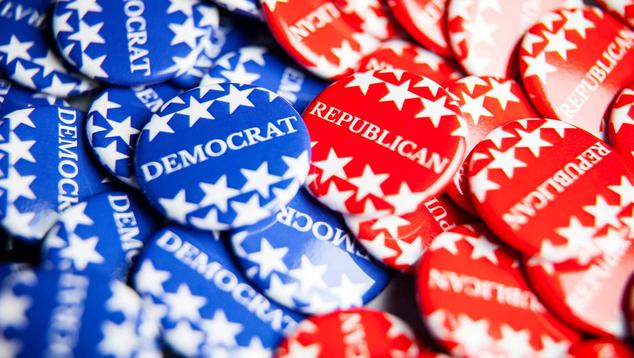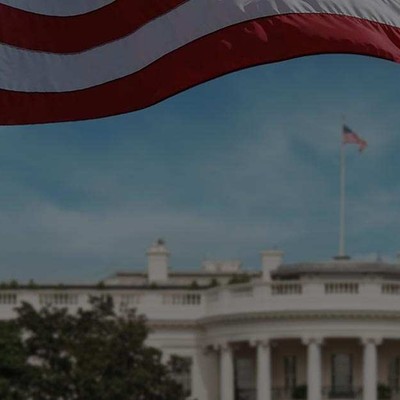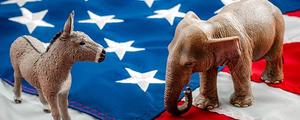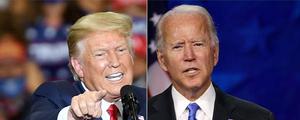Story Highlights
- 47% have a favorable view of Democratic Party; 42%, of GOP
- Republican Party's image has slid since January
- Majority in U.S. say third party is needed
WASHINGTON, D.C. -- Americans' opinions of the Republican Party have soured since January but are similar to what they were a year ago. Meanwhile, Americans' favorability ratings of the Democratic Party (47%) have been stable and again surpass those of the GOP (42%).

Line graph. More Americans have a favorable opinion of the Democratic Party than the Republican Party, a change from January. During most of the past four years, the Democratic Party has been viewed at least slightly more positively than the Republican Party.
These results are based on Gallup's annual Governance poll. In recent years, Americans have not held either party in high esteem -- the 51% January rating for the Republican Party amid President Donald Trump's impeachment trial was a rare majority-level positive reading for either party.
Before January, Republican favorability had not exceeded 50% in 15 years. The Democratic Party has not had a favorable rating of 50% or above since 2012, immediately after Barack Obama's reelection as president. Before 2005, majority positive readings for one or both parties were the norm.
Four years ago, when Trump and Hillary Clinton were campaigning for president, Americans' views of both parties were slightly less positive than today, with Democrats still holding a slight advantage in favorability, 42% to 39%.
Americans Increasingly See Parties as Too Extreme
In an era of intense partisanship, the public has increasingly come to view both parties as being "too extreme" rather than "generally mainstream." Forty-seven percent now see the Republican Party as too extreme, and 42% say the same about the Democratic Party. Both figures are up about 10 percentage points since Gallup last asked the question in 2004, and even more from 2000, when the question was first asked.
Still, a slim majority of Americans believe the Republican Party is in the mainstream, and a higher 57% say the same of the Democratic Party.
| 2000 | 2004 | 2020 | ||||||||||||||||||||||||||||||||||||||||||||||||||||||||||||||||||||||||||||||||||||||||||||||||||
|---|---|---|---|---|---|---|---|---|---|---|---|---|---|---|---|---|---|---|---|---|---|---|---|---|---|---|---|---|---|---|---|---|---|---|---|---|---|---|---|---|---|---|---|---|---|---|---|---|---|---|---|---|---|---|---|---|---|---|---|---|---|---|---|---|---|---|---|---|---|---|---|---|---|---|---|---|---|---|---|---|---|---|---|---|---|---|---|---|---|---|---|---|---|---|---|---|---|---|---|---|
| % | % | % | ||||||||||||||||||||||||||||||||||||||||||||||||||||||||||||||||||||||||||||||||||||||||||||||||||
| Republican Party | ||||||||||||||||||||||||||||||||||||||||||||||||||||||||||||||||||||||||||||||||||||||||||||||||||||
| Too extreme | 35 | 37 | 47 | |||||||||||||||||||||||||||||||||||||||||||||||||||||||||||||||||||||||||||||||||||||||||||||||||
| Generally mainstream | 57 | 59 | 52 | |||||||||||||||||||||||||||||||||||||||||||||||||||||||||||||||||||||||||||||||||||||||||||||||||
| Democratic Party | ||||||||||||||||||||||||||||||||||||||||||||||||||||||||||||||||||||||||||||||||||||||||||||||||||||
| Too extreme | 26 | 34 | 42 | |||||||||||||||||||||||||||||||||||||||||||||||||||||||||||||||||||||||||||||||||||||||||||||||||
| Generally mainstream | 67 | 62 | 57 | |||||||||||||||||||||||||||||||||||||||||||||||||||||||||||||||||||||||||||||||||||||||||||||||||
| 2000 and 2004 results are based on an average of two surveys conducted each year. | ||||||||||||||||||||||||||||||||||||||||||||||||||||||||||||||||||||||||||||||||||||||||||||||||||||
| Gallup | ||||||||||||||||||||||||||||||||||||||||||||||||||||||||||||||||||||||||||||||||||||||||||||||||||||
Democrats and independents show similar increases in the perception that the GOP is too extreme, with a 15-point increase since 2004 among Democrats (from 64% to 79%) and a 12-point increase among independents (from 40% to 52%).
Most of the change in views of the Democratic Party has come among Republicans, with 88% now saying the Democratic Party is too extreme, up from 64% in 2004.
A separate question measuring the perceived extremism of the two major-party presidential nominees finds 40% of Americans saying they are "very concerned" that Donald Trump "may be too closely aligned with people who hold radical political views," while 31% say the same about Joe Biden.
Trump is far more likely to be viewed as aligned with radicals than either Barack Obama (28%) or John McCain (17%) was in 2008, the last time Gallup asked this question.
Republicans Rated No Worse Than Democrats on Prosperity, Security
Although the Democratic Party has a more positive image than the Republican Party, Americans believe the GOP is no worse, if not better, than the Democratic Party for keeping the country safe from external threats (50% versus 46%, respectively) or for keeping the country prosperous (47% versus 48%).
The Republican Party has typically fared better than the Democratic Party on the security issue, but the current four-point GOP advantage is among the smallest Gallup has measured since it first asked the question in 2002. Americans thought the Democratic Party was better on the issue in 2007; the parties were tied in 2012; and the Republican Party had a two-point edge in 2006.

Line graph. Americans, by 50% to 46% in 2020, say the Republican Party will do a better job of protecting the country from international terrorism and military threats. In most years, Republicans have held an advantage on this, with the largest being 55% to 32% in 2014. Democrats had an advantage only in 2007, 47% to 42%.
The Democratic Party trailed the Republican Party for keeping the country prosperous during much of Barack Obama's presidency and early in Donald Trump's presidency, but it led during most of George W. Bush's time in office.

Line graph. Forty-eight percent of Americans believe the Democratic Party and 47% believe the Republican Party will do a better job of keeping the country prosperous. Republicans have led on this measure for most of the past 10 years, while Democrats led the prior six years.
Where Americans clearly give the Democratic Party an edge is in being better able to deal with the problem they think is most important. By 47% to 39%, Americans say the Democratic Party can better handle whatever they personally consider to be the most important problem, particularly if they name the coronavirus pandemic, which ties with "the government" as the most-commonly mentioned issue.
Majority Says Third Party Is Needed
Americans' frustration with the parties is evident in the 57% of Americans saying a third party is needed, while 40% think the two major parties are doing an adequate job of representing the American people.
Americans tended to be more positive about the performance of the parties before 2010 -- with the exception of 2012, after the Democratic convention that year.

Line graph. Fifty-seven percent of Americans in 2020 say a third major party is needed, while 40% say the two major parties do an adequate job of representing the American people.
As has been the case historically, political independents (72%) are much more likely than Democrats (52%) and Republicans (40%) to say a third party is needed.
Bottom Line
The Democratic Party is heading into the final weeks of the presidential election campaign with a more positive image than the Republican Party, something that was not the case earlier this year during the impeachment hearings. The coronavirus pandemic, or, more specifically, Trump's handling of it, has arguably been a major factor in improving the Democratic Party's positioning this year. At a time when 14% of Americans are satisfied with the way things are going in the country, but the GOP is seen as no worse than the Democratic Party on matters of security and prosperity, a greater focus on those issues may help the GOP improve its long odds of winning the 2020 presidential election.
View complete question responses and trends (PDF download).
Learn more about how the Gallup Poll Social Series works.





